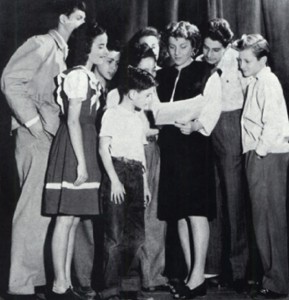 In the early 1940s, social worker Viola Spolin developed a suite of theater games to stimulate creative expression and build community among Chicago’s diverse immigrant populations. Spolin’s son Paul Sills, founder of legendary theater The Second City, offered up his mother’s games to his comedic ensemble; and ever since, improvisers the world over have played them in order to hone their craft.
In the early 1940s, social worker Viola Spolin developed a suite of theater games to stimulate creative expression and build community among Chicago’s diverse immigrant populations. Spolin’s son Paul Sills, founder of legendary theater The Second City, offered up his mother’s games to his comedic ensemble; and ever since, improvisers the world over have played them in order to hone their craft.
But here in Los Angeles, since the founding of non-profit Laughter for a Change (L4C) in 2007, these games have returned to their original context and purpose: helping to build confidence and meaningful connections among residents of underserved communities.
During 2011-2012, L4C founder/director Ed Greenberg ran an after-school workshop with a dozen predominantly low-income, Latino high school freshmen; a trained improviser/doctoral candidate acted as a participant-observer during this year. Through analysis of ethnographic fieldnotes, surveys, and interviews, they found that improvisational theater games provided a no-tech context to practice skills vital to media literacy, such as negotiating trust and exploring identity. As articulated by Felt and Rideau (2012), developing these skills, even in no-tech contexts, prepares learners to apply them in mediated contexts.
In terms of products, participants reported less shyness, more self-confidence, increased comfort with public speaking, greater participation in academic classes, a broader view of teamwork, and fun. L4C’s use of games may help to explain its educational effectiveness. According to USC’s Project New Media Literacies, play “supports constant learning and innovative responses to our surroundings” (Reilly, Jenkins, Felt & Vartabedian, 2012, p. 6). Positive affective climates such as L4C’s also predict such educational boons as greater academic risk-taking and increased motivation (Meyer & Turner, 2006).
L4C’s website claims, “Laughter is powerful. Laughter heals. Laughter builds community.” This study’s findings suggest that L4C’s pedagogy is powerful too, and might help to leverage formal and informal educational settings for healing challenged communities.

